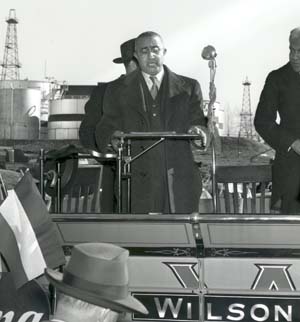DUNJEE, ROSCOE (1883–1965).
Roscoe Dunjee, editor of Oklahoma City's only Black newspaper, led the way in the struggle for civil rights in Oklahoma and in the Oklahoma City Black community. From 1915 to 1954 Roscoe Dunjee published the Black Dispatch and endeavored "to interpret the mind, the aspiration, the object, and longing of his people" to the broader community.
Dunjee was born June 21, 1883, in Harper's Ferry, West Virginia, to John William and Lydia Ann Taylor Dunjee. John Dunjee, financial agent for Storer College, also published the Harper's Ferry Messenger. After the American Baptist Missionary Society hired John Dunjee, who was also a Baptist minister, to organize Baptist work throughout North America, in 1892 the Dunjee family was sent to Oklahoma Territory. After ten years of laboring in Oklahoma, John Dunjee died. Until age thirty-two Roscoe was to support his mother Lydia, sister Drusilla (Houston), and brother Irving by raising and selling vegetables.
Roscoe Dunjee bought a small-job printing plant from Olivia J. Abby, a teacher in the Oklahoma City Public Schools, and printed the first issue of the Black Dispatch on November 5, 1914. Dunjee's education does not indicate any preparation for newspaper editing. He had attended a one-room school on the Anderson farm and had finished one year in the Oklahoma's Colored Agricultural and Normal University (now Langston University) elementary department. Otherwise, he was self-taught and read extensively in a fifteen-hundred-volume library inherited from his father. Blessed with tremendous natural ability, he possessed an analytical mind. He wrote lucidly and was a great orator. These skills served him well as an editor. The Black Dispatch anchored his leadership in the Oklahoma City Black community. It allowed him to pursue multiple interests and bestowed upon him the ability to define issues and to suggest solutions.
Dunjee was vitally interested in the work of the National Association for the Advancement of Colored People (NAACP). A member of the NAACP's national board of directors, he served for sixteen years as president of the Oklahoma State Conference of Branches of the NAACP. In 1932 the Guthrie, Tulsa, Chickasha, Muskogee, and Oklahoma City branches met and formed the nation's first state conference of NAACP branches. Dunjee believed that this type of structure would allow the pooling of resources for a more effective fight against discrimination and segregation. Under Dunjee's leadership the state organization became involved in several court cases that would affect segregation in Oklahoma. Some of the more important involved Ada Lois Sipuel (Fisher) and George McLaurin, cases that dealt with segregation in higher education, and the Jess Hollins case, which focused on segregated juries.
Dunjee was also a fervent booster of Black economic advancement and fraternal societies. He served as president of the local chapter of the National Negro Business League in Oklahoma City. The league, founded by Booker T. Washington in 1900, emphasized the values of thrift, industry, self-help, and Black support of Black business. To Dunjee the league was not only designed to encourage Black business but also to unite the entire race. He envisioned that his local chapter of the Business League would provide the leadership to tackle some of the economic problems besetting the Black community. While Dunjee spent a great deal of time in the role of economic booster, he also worked closely with his fraternal society, the Knights of Pythias. The Black Dispatch promoted the Knights in Oklahoma. Fraternal societies like the Knights played an important role in the Black community by developing Black leadership and providing fellowship; some of these societies functioned as insurance companies.
In all his varied activities Roscoe Dunjee's aim was the elevation of the race. He tirelessly worked for the civil rights of Black Americans. Whether in a scathing editorial denouncing injustice or in a speech before an organization, he was uncompromising in his stand for equality and justice. On March 1, 1965, at the age of eighty-one, Roscoe Dunjee died.
See Also
AFRICAN AMERICANS, CIVIL RIGHTS MOVEMENT, ADA LOIS SIPUEL FISHER, HOLLINS v. STATE OF OKLAHOMA, DRUSILLA DUNJEE HOUSTON, LANE v. WILSON, LYNCHING, McLAURIN v. OKLAHOMA STATE REGENTS, NAACP, NEWSPAPERS–AFRICAN AMERICAN, GEORGE NAPIER PERKINS, SEGREGATION, ANDREW J. SMITHERMAN, WILLIAM HENRY TWINE
Learn More
Bob Burke and Angela Monson, Roscoe Dunjee, Champion of Civil Rights (Edmond: University of Central Oklahoma Press, 1998).
Worth J. Hadley, "Roscoe Dunjee on Education: The Improvement of Black Education in Oklahoma, 1930–1955" (Ed.D. diss., University of Oklahoma, 1981).
John H. L. Thompson, "The Little Caesar of Civil Rights: Roscoe Dunjee in Oklahoma City, 1915 to 1955" (Ph.D. diss., Purdue University, 1990).
Citation
The following (as per The Chicago Manual of Style, 17th edition) is the preferred citation for articles:
John H. L. Thompson, “Dunjee, Roscoe,” The Encyclopedia of Oklahoma History and Culture, https://www.okhistory.org/publications/enc/entry?entry=DU007.
Published January 15, 2010
Last updated July 24, 2024
© Oklahoma Historical Society


